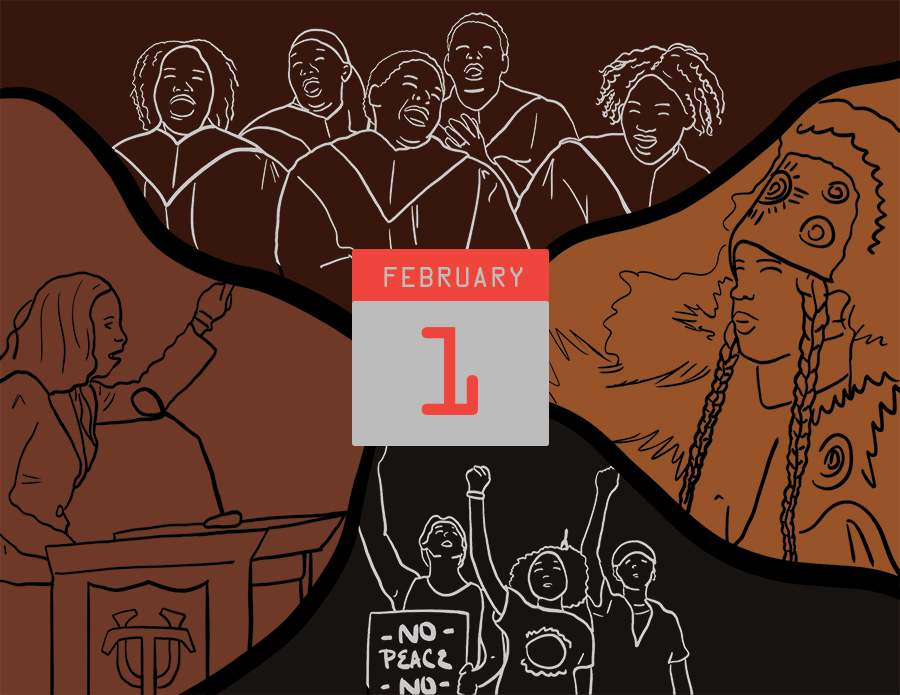How do you celebrate Black History Month at a university with so few Black people?
February 6, 2020
I grew up celebrating Black History in my great-grandfather’s church in Detroit. For 18 years, three generations of my family spent every February in a gospel-induced fervor, belting and dancing to my ancestors’ hymns. Even my great-grandfather, a reserved Baptist preacher, would join his talented — but undeniably gay — great-grandson for a chorus of “Oh Freedom” before his sermons. While loud and cacophonous, honoring our ancestors through gospel created enough warmth to keep out the frigid Michigan winters.
Choosing to attend Tulane meant saying goodbye to my family’s church, our hymns and the faith community that helped shape me. My grandmother assured me that being the first in my family to attend college would justify every single one of the 1066 miles of separation. And yet, that pretext never seemed to dampen the irritation I felt when I saw white Tulane students parroting K***e’s gospel lyrics, a lukewarm imitation of the music that raised me. My Februarys, though now devoid of snow, became a lot less warm after moving to Tulane.
You could imagine my surprise when I experienced my first Mardi Gras. Situated two weeks into the worst Black History Month of my life, the season suddenly exploded into color. It was ardent, radiant Blackness. The city spun around me. Mardi Gras Indians danced down Dryades while, at night, Black flambeaux-bearers led their processions like flame-wielding kings. Even high school marching bands played their instruments with a startling new intensity. The silence that filled my weeks had been broken by brass bands, just as loud and cacophonous as a Black boy in church.
Black History Month is the annual reminder of the historical and contemporary Black presence in everyday life. Started in 1915, the 50th anniversary of the signing of the 13th Amendment, it commemorates the movement from one form of subjugation to another. Even though the Amendment abolished formal slavery, it allowed it “as a punishment for crime,” meaning that more nuanced forms of inequality could persist, which they did. This led to the mass incarceration of Black Americans and the subsequent move to further criminalize Blackness.
The second month of a new year became the time to celebrate not only Black history, but also Black life. Marches to honor ancestors and marches demanding liberation became one in the same. Community service rose as a formative way of sustaining the environment and building community. And it is especially common to spend the month with older family and friends, listening to stories and passing down the knowledge of how far we’ve come.
How do you celebrate Black History Month at a university with so few Black people? The truth is Tulane’s Black community is comprised of more than just students. Sodexo workers, Allied Security guards and university custodial staff are integral members of the Tulane community. Organizing as Black students on this campus has always meant organizing for the collective rights of Black students, staff and faculty. And so each feat of resistance, big or small, to improve the life of Black people on this campus is a celebration. Community engagement, like gospel, is ancestral and just as sacred.
It’s impossible to ignore Black History Month at a predominantly white institution. In lecture halls, I walk to class under the watchful paintings of people who probably wanted to lynch my great-grandfather. Their great-grandchildren, sitting in a building bearing their last name, will stare as I enter the classroom and wonder which affirmative action policy provided my seat. It’s a blessing and a curse to constantly rewrite history.
Me walking around my PWI during BLACK HISTORY MONTH ✊🏿✊🏽✊🏾 pic.twitter.com/7tK94Y05A6
— Jordyn🌈 (@ilovejordyn0) February 1, 2020
Black History Month at Tulane, I came to realize, would never be a minor celebration. There’s too much pride, resilience and joy in Tulane’s Black community to be hidden by the campus’ whiteness. My overwhelming sense of pride in my community is mirrored in the work of Tulane’s Black women and femmes who win multiple elections, create documentaries and make their lasting marks on Tulane’s campus. To contribute to their work is to stand on the shoulders of giants.
This February, while Black students celebrate how far we’ve come, I’d encourage everyone else to extend extra grace to your Black friends. We’re making space on a campus that was never built for us with students that seem diametrically opposed to sharing space. It’s going to take learning, unlearning and discomfort for non-Black Tulanians to be in solidarity with their Black classmates.
Interested in engaging with Black History at Tulane? Here are a couple of events you should check out!
Indya Moore Keynote – February 17th @ McAlister Auditorium 6:15 – 7:45 p.m.
Mike “NOT Supposed 2-Be Here” Exhibit – on display @ Newcomb Art Museum until May 23, 2020
Afrosexology – Thursday, February 13th 6 – 8 p.m. in the LBC Rathskeller Lounge (POC-centered space)
“MAJOR!” Screening (Tulane After Dark)- Thursday, February 13 9 p.m., @ Rathskeller Lounge























Jo! • Feb 7, 2020 at 6:20 am
What a beautifully written piece